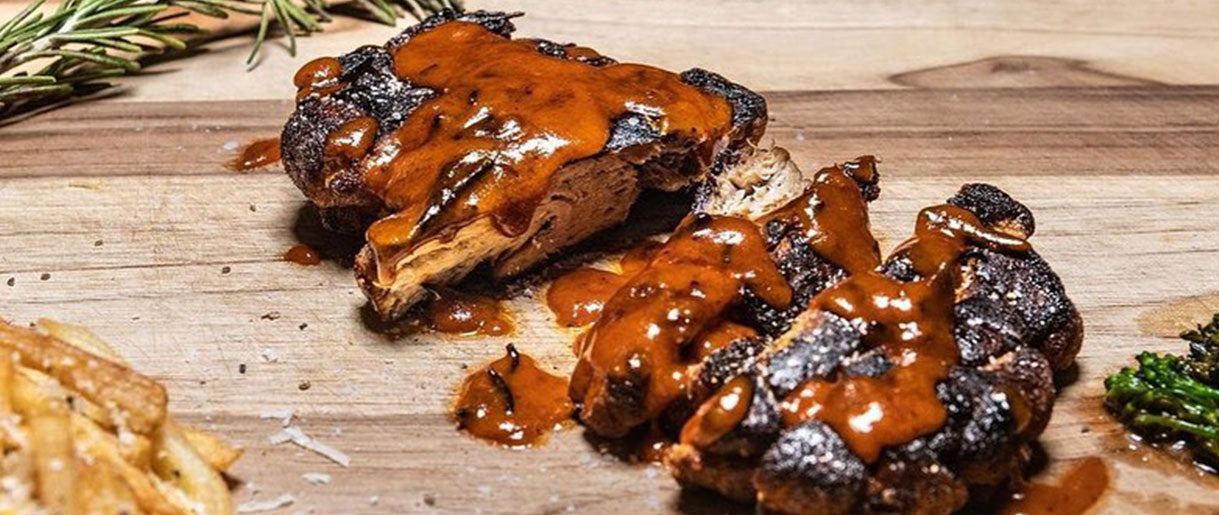People are shifting to plant-based diets to enhance their health and help the environment. However, they must still achieve their daily nutritional requirements, which is where mushrooms come in.
Mushrooms are your secret weapon when you want to eat something meaty without really eating meat. There are numerous mushroom varieties to try, each with its own distinct flavor and texture.
Mushrooms are delicious, healthy, functional foods that contain high-quality proteins and require little space, water, and energy to grow. Due to their umami flavor, vitamin and mineral richness, and protein and amino acid profile, mushrooms are an excellent meat substitute meaty texture.
You've undoubtedly noticed that mushrooms take center stage in many meatless meals, whether you're a flexitarian, just want to eat less meat or vegetarian. So, let’s look at the best mushroom substitute for meat.
Why Mushrooms Make The Perfect Meat Substitute

Mushrooms are small wonders that can be utilized in various cuisines. They have significant nutritional properties that blend perfectly with our regular and healthy lifestyle. Mushrooms are not vegetables; they are the fruiting bodies of mushrooms, and their nutritional profile is more similar to that of animals than that of plants. As a result, their proteins are high in critical amino acids that are not available in many plant-based foods, making them an excellent addition to a vegetarian or vegan diet.
Although they are not high in protein, mushrooms are an excellent meat substitute. Mushrooms alone are not a nutritional substitute for meat because they lack protein and have less iron, zinc, and vitamin B12.
However, these small wonders outshine meat in many ways: they are high in minerals such as selenium and vitamins like B1, B2, B5, and B6. As a result, when paired with another appropriate source of protein, you'll get all the protein you need and additional beneficial nutrients and active chemicals not present in meat. Furthermore, they are high in antioxidants and low in carbohydrates and fat. They are the only vegetable that contains vitamin D naturally because of their exposure to sunshine.
You can replace a quarter to half of the meat in meaty dishes with mushrooms to create a dish that is reduced in calories but still delicious. Another advantage of substituting mushrooms for meat is that they are low in fat and cholesterol.
Looking for reasons to try mushroomas meat replacement? Here are some:
Flavor

Mushrooms are commonly described as "earthy," but this does not convey their depth of flavor. Because of glutamate, an amino acid, all mushrooms have the mystical "fifth taste" known as umami. Glutamate is a crucial component of why meat tastes savory—and why mushrooms may be so filling.
Plant-based meals without umami can feel like they're missing something vital. However, when mushrooms are substituted for meat, the savory flavor remains, usually with some sweet undertones to balance it out. Mushrooms are particularly excellent at absorbing sauces and flavors, allowing you to personalize each dish.
The umami flavor of mushrooms is delightful, making them suitable for adding to spaghetti sauce, for example, to preserve a rich flavor and texture while lowering or eliminating the meat content.
Texture

When cooked properly, all species of mushrooms offer distinct textures that complement plant-based diets. Some are soft and meaty, while others are firm and chewy. There are also flaky, tender, and creamy mushrooms.
The texture of mushrooms is affected by marinades, cooking methods, and even cooking time, giving you complete control over how they turn out. We encourage you to try different mushrooms and cooking methods.
Mushrooms have mastered the taste and texture of a meat substitute. But what about the nutritional profile of mushroom meat substitutes?
Nutritional Benefits Of Mushroom Substitutes

Consider the nutritional profile of 100 grams of white button mushroom, the most common type of mushroom:
- 22 calories.
- 3.1 grams protein.
- 3.3 grams carbohydrates.
- 1 gram of fiber.
- 0.3 grams fat.
- 18% DV vitamin B3.
- 16% DV copper
- 24% daily value (DV) vitamin B2.
- 15% DV vitamin B5.
- 9% DV phosphorous.
- 13% DV selenium.
That's a good quantity of nutrition for a low-calorie, high-water food. However, as you can see, it is not a one-to-one protein equivalent to meat.
Mushroom vs. meat

The most noticeable difference between mushrooms and meat is their protein content. Meat offers substantially more protein than mushrooms, and if mushrooms were your only source of protein, you'd have to consume a lot of them. A 100g (3.5 oz) portion of chicken, for example, has 31g (1.09oz) of protein, but a 100g (3.5 oz) serving of oyster mushrooms contains 3.3g (0.12oz) of protein.
However, there are numerous disadvantages to consuming meat. For example, several national dietary advice bodies worldwide and the World Health Organization (WHO) have recently recommended reducing red and processed meat consumption based on consistent evidence linking highly processed meat to several diseases, including colorectal cancer.
In a study(1), 474,985 middle-aged people were recruited for the UK Biobank project. Researchers looked into meat consumption in general and its relationship to 25 common illnesses.
According to the findings, participants who reported regular meat-eating (defined as three or more times per week) experienced more remarkable adverse health outcomes than those who consumed meat less frequently.
Furthermore, increased consumption of unprocessed and processed red meat was linked to an increased risk of ischemic heart disease, pneumonia, diabetes, diverticular disease, and colon polyps.
However, higher consumption of unprocessed red meat alone was linked to a decreased incidence of iron deficiency anemia. Participants who consumed poultry meat had an increased incidence of gastroesophageal reflux disease, gastritis and duodenitis, diverticular disease, gall bladder disease, and diabetes. As with unprocessed red meat, poultry eating reduced the risk of iron deficiency anemia.
Consuming mushrooms may reduce your risk of contracting these diseases. When combined with other high-protein foods such as lentils, beans, tofu, or chickpeas, those on plant-based diets can quickly meet their protein requirements.
Three Best Mushrooms To Use As Meat Substitutes
Now that we know that mushrooms efficiently act as an earth meat in a plant-based diet, we’re looking for the best mushrooms for meat substitute. Here are our top three picks.
1. Portobello: The Original Plant-Based Burger

First on our list of mushrooms that taste like meat is portobello. The portobello mushroom is well-known for its flavor variety, big size, and fullness of texture. It is widely utilized and well-known in the plant-based community because of its accessibility and affordability!
The portobello mushroom is interesting since it can be chopped into smaller pieces or eaten whole. It works well on the barbecue or in the oven. It's simple to construct sandwiches or sliders out of it, and it may even be seasoned and served as a whole "mushroom steak." The portobello mushroom absorbs many flavors from anything you marinade it in!
The portobello mushroom shines in its first appearance as an Italian-style tomato, basil, and arugula sandwich. It's light enough to serve as a patty atop a pineapple teriyaki mushroom burger. It is also lovely when served as a main course with asparagus and mashed potatoes seasoned with spices and peppers. The portobello mushroom has limitless creative possibilities because it can be packed with delicious vegan cheese, veggies, and quinoa for a filling supper!
2. Lion's Mane Mushrooms: A Vegan Solution To Seafood Cravings

Don't be startled by the hairy appearance of Lion's mane! Even though it appears to be someone's bizarre idea of a round accent cushion, the feel of this mushroom is chewy rather than fuzzy. Lion's mane has one of the most unusual flavors of any mushroom, light and delicious with a distinct note of fish.
Many people who have tasted Lion's mane mushroom for culinary or medicinal purposes have described it as tasting like lobster or crab meat but with earthier undertones. Furthermore, the flavor of fresh Lion's mane is stringy and soft, with a chewy and juicy bite.
Lion's mane mushrooms have a pleasantly sweet flavor and a soft texture similar to shellfish such as scallops, crab, or lobster. As a result, they are frequently used as a complement or substitute for seafood.
The flavor of Lion's mane mushrooms varies depending on the cooking method and whether they are fresh or dried Lion's mane. Cooked Lion's mane mushrooms have a more robust flavor, with the sweetness becoming more apparent. On the other hand, the flavor of dried Lion's mane can be more concentrated and potent.
However, there is no discernible change when Lion's mane is substituted for crab, clams, shrimp, or lobster in recipes such as crab cakes, seafood alfredo, lobster rolls, gumbo, and pasta with garlic clam or shrimp sauce.
3. Maitake: Natural Chicken Substitute

Maitake mushrooms, often known as hen of the woods, are a delectable wild fungus that tastes eerily like chicken meat. They have a sumptuous, meaty texture and a strong umami flavor, making them an excellent meat substitute. Maitake mushrooms are high in vitamin D, phosphate, and potassium. Look no further for a hearty mushroom or convincing plant-based chicken for your favorite dishes!
Culinary Applications: Using Mushrooms As Meat Substitutes

You can't go wrong with these selections, from burgers to tacos and bacon. Let's look at how tasty mushrooms may be in your favorite meaty recipes.
1. Bacon:
The mushroom's capacity to absorb savory sauces comes in handy here. Mushrooms soak up all the flavor of bacon when soaked in a smoky, umami-rich sauce (think liquid smoke, soy sauce, smoked paprika). They can then be thinly sliced, pan-fried, or oven-roasted for a bacon-like topping for burgers, salads, and breakfast sandwiches.
2. Burgers:
You don't need a pre-made meat substitute to produce a delicious veggie burger; you only need mushrooms, culinary know-how, and a hot pan. Unlike other vegetable-based patties, mushroom burgers brown nicely with a bit of oil and ample heat. The result is crispy outside and juicy inside, just like your favorite fast food burger.
3. Kebabs:
On the grill, substitute mushrooms for your favorite marinated chicken. Mushroom kebabs compete with the best fowl versions because they absorb your preferred marinade or BBQ sauce and brown beautifully on the grill.
4. Pizza topping:
This fungus pie is excellent, and it includes a complete dose of vegetables in addition to your Friday night pizza fix. To bring out the taste of the mushrooms, simmer them down before adding them to the pizza.
5. Pasta sauce:
Mushrooms can be a meatless substitute for bacon or guanciale in creamy carbonara or finely minced for a vegetarian version of Sunday sauce or your favorite bolognese (think meat-free red sauce).
FAQs About Mushroom Substitute For Meat
Are Mushrooms A Complete Protein Source, And How Do They Compare To Meat In Terms Of Protein Content?
Many mushrooms are complete proteins because they include all nine essential amino acids, though not in the same concentration as meat. In contrast, most plant-based proteins lack one or more amino acids.
Can I Combine Mushrooms With Other Plant-Based Proteins To Enhance Their Nutritional Value?
Mushrooms can be combined with other plant-based proteins to enhance their nutritional value. Because some plants have more protein than mushrooms, dietitians advocate pairing mushrooms with other high-protein vegetables on a plant-based diet.
Can You Make Mushroom Taste Like Meat?
Portobello mushrooms are a popular meat replacement because of their huge size, earthy, meaty flavor, and deep, steak-like texture. Grilled portobello mushroom caps offer rich, deep, umami flavors that complement burger patties and steaks.
Key Takeaway
Mushroom substitute for meat is an excellent idea since mushrooms are one of the most fantastic vegetarian meat replacements. To begin, mushrooms are inherently chewy, crisp up beautifully, and readily absorb great sauces to enhance their flavor. In addition to flavor and texture, mushrooms are an environmentally beneficial alternative to meat, and they are often less expensive.
Fungi are delicious, healthful, and sustainable veggies that can quickly cut meat consumption. Eating a mushroom burger has never been more enjoyable; it has minimal calories, carbs, fat, and sodium. Eventually, we believe mushrooms should be included in every meal.
References
- Meat consumption and risk of 25 common conditions: outcome-wide analyses in 475,000 men and women in the UK Biobank study, (1)https://pubmed.ncbi.nlm.nih.gov/33648505/








Let Us Know Your Comments